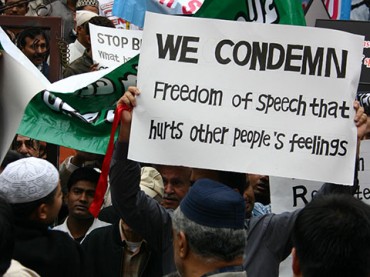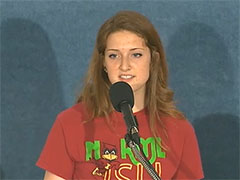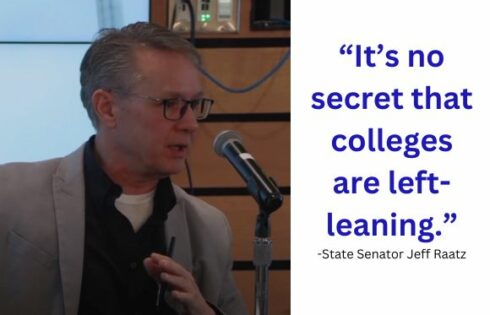
Public colleges that retain speech codes were given notice Tuesday by the Foundation for Individual Rights in Education that they could be hit with costly First Amendment lawsuits.
The group announced it had filed four lawsuits Tuesday against schools in the Midwest and California – on top of two filed in the past several months – at a press conference in Washington, D.C. Two of them involve banned T-shirts.
FIRE is planning a “massive litigation campaign” under the Stand Up For Speech project, President Greg Lukianoff told the press conference.
“We’ve been hesitant to go the road of being primarily a litigation group,” but over the past couple years FIRE has realized “we’re not achieving enough” just by public education, Lukianoff said.
 “We really want to get general counsels considering freedom of speech when they’re writing their [schools’] policies” affecting free expression, Lukianoff said.
“We really want to get general counsels considering freedom of speech when they’re writing their [schools’] policies” affecting free expression, Lukianoff said.
Three in five campuses nationwide still have “unambiguously unconstitutional” codes because universities believe there’s no “downside” to them, Lukianoff said.
Schools believe codes can shield them from liability in harassment and other lawsuits, Lukianoff said: FIRE wants to change “this amoral calculus.”
FIRE said in a press release it would file suit against schools with unconstitutional codes in each federal appeals circuit, and after “each victory by ruling or settlement,” it would “target another school in the same circuit—sending a message that unless public colleges obey the law, they will be sued.”
‘We Get You Off For Free’ and ‘Marijuana’
 Ohio University is being sued for stopping Students Defending Students, which defends students accused of disciplinary offenses at no cost, from wearing T-shirts that say “We Get You Off For Free,” Isaac Smith, a member of the group, told the press conference.
Ohio University is being sued for stopping Students Defending Students, which defends students accused of disciplinary offenses at no cost, from wearing T-shirts that say “We Get You Off For Free,” Isaac Smith, a member of the group, told the press conference.
Conversations with administrators about the shirts’ propriety were “thinly veiled mandates” to stop wearing them, Smith said.
The campus has a “climate that’s very unfriendly for expressing an opinion,” though it has a new “radical student government” that’s itching to protest the administration, Smith said.
The campus chapter of the National Organization for the Reform of Marijuana Laws (NORML) is suing Iowa State University for preventing members from wearing T-shirts that say “NORML ISU Supports Legalizing Marijuana.” The school claims the shirts imply that ISU supports legalization.
“We’re not comfortable with this kind of thing,” having exhausted every other option before suing, NORML ISU leader Paul Gerlich told the press conference.
Other student groups are now “against us and they think it’s our fault” that administrators are cracking down, Gerlich said.
 “We’ve seen more resistance from the university than other clubs” have, and the school has stopped the chapter from even putting the word “marijuana” on T-shirts, leader Erin Furleigh added.
“We’ve seen more resistance from the university than other clubs” have, and the school has stopped the chapter from even putting the word “marijuana” on T-shirts, leader Erin Furleigh added.
Furleigh described her realization that there wasn’t so much a “process” for getting T-shirts approved by the school’s trademark licensing office, as there was getting “sent from one official to another” with no end in sight.
“’Are we really wrong here?’” Furleigh said she remembers asking FIRE when it looked into suing. “’I feel bad, and I don’t think I should feel bad about this!’”
The other two suits are against California’s Citrus College, for among other things reinstituting a speech zone it agreed to abolish after a 2003 lawsuit, and Chicago State University, which FIRE says adopted a far-reaching cyberbullying policy to silence a critical faculty blog, CSU Faculty Voice.
‘Mindless’ Enforcement Amid ‘Bureaucratization’
Many codes are remnants of the “philosophical zeal” of the 1980s and 1990s, when universities genuinely believed they could stop harassment by restricting speech, Lukianoff said.
Enforcement today is just “mindless applications of these rules” from long ago, Lukianoff said, noting the “mass expansion of bureaucratization” in universities in contrast to the stagnant or shrinking full-time teaching workforce.
First Amendment lawyer Bob Corn-Revere of the Davis Wright Tremaine law firm is serving as counsel to FIRE and students and faculty filing lawsuits, and other DWT offices around the country will assist.
Campuses are supposed to be the “quintessential marketplace of ideas,” yet they ignore Supreme Court precedent that is “well established,” Corn-Revere told the press conference.
FIRE’s previous lawsuits target schools that told students they couldn’t freely pass out copies of the Constitution: Modesto Junior College, which settled for $50,000 in February, and the University of Hawaii-Hilo, which suspended its zone policy as the case proceeds.
Greg Piper is an assistant editor at The College Fix. (@GregPiper)
Like The College Fix on Facebook / Follow us on Twitter
IMAGES: Sam Graham/Flickr, Internet screenshot, OUsds/Facebook, Internet screenshot





Please join the conversation about our stories on Facebook, Twitter, Instagram, Reddit, MeWe, Rumble, Gab, Minds and Gettr.